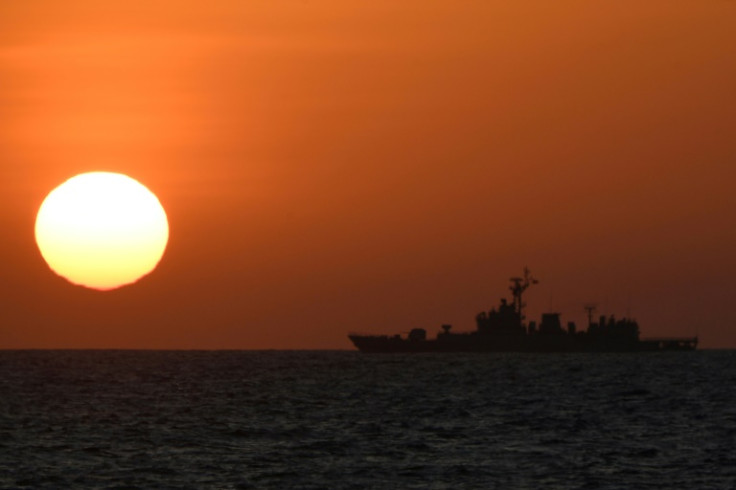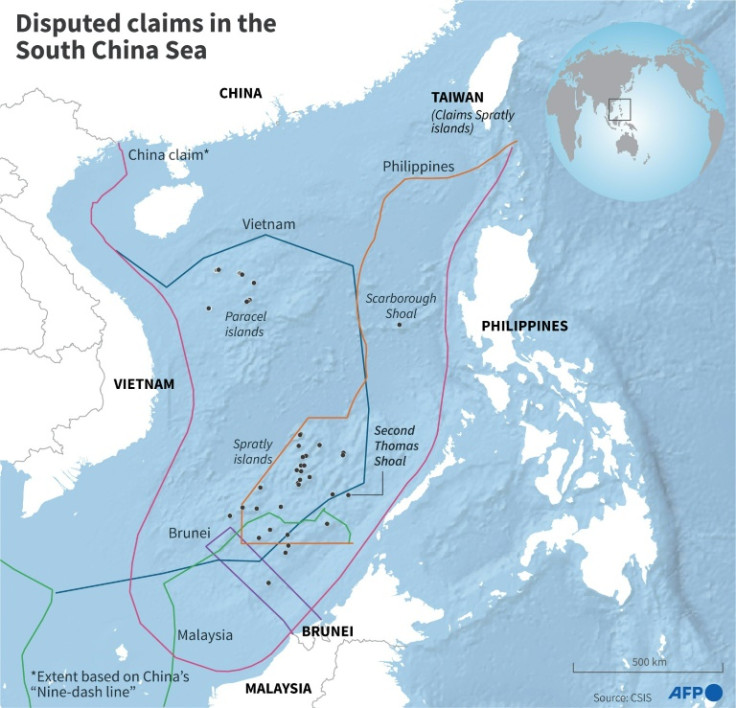China Launches Air, Sea Patrols Near Flashpoint Reef As US Holds Joint Drills

China carried out a combat patrol to test "strike capabilities" near a flashpoint reef in the South China Sea on Wednesday, as the United States and its allies held joint military drills in the same waters.
Tensions in the disputed waterway have spiked following a series of escalating confrontations between Chinese and Philippine vessels that have fanned fears of a wider conflict that could draw in the United States due to its mutual defence treaty with Manila.
Beijing claims almost the entire South China Sea, brushing off rival claims of several Southeast Asian countries, including the Philippines, and an international ruling that its assertion has no legal basis.
Its claims include the waters around Scarborough Shoal -- which Beijing seized from Manila in 2012 -- where the Chinese military's Southern Theater Command said Wednesday it had held joint sea and air patrols.
The triangular chain of reefs and rocks is 240 kilometres (150 miles) west of the Philippines' main island of Luzon and nearly 900 kilometres from the nearest major Chinese land mass of Hainan.
Beijing said the manoeuvres tested "the reconnaissance and early warning, rapid mobility, and joint strike capabilities of theatre troops".
The announcement came as the Philippines on Wednesday launched two days of sea and air exercises with the United States, Canada and Australia, according to a joint statement.
A Philippine military spokesman told AFP the drills were taking place in the West Philippine Sea, which is what Manila calls the South China Sea waters to the immediate west of the archipelago.
The Chinese coastguard also conducted a separate patrol on Wednesday to "uphold its rights" around another group of contested islands in the East China Sea that are administered by Japan, Beijing's state media said.
China has long used its coastguard to assert its claims in the South China Sea, which analysts describe as "grey zone" harassment tactics that fall short of an outright act of war.
And while the Chinese military had been deployed near Scarborough Shoal in the past, one analyst told AFP Wednesday's action showed they were "becoming more aggressive and forceful".
"It's meant to intimidate," Jay Batongbacal, director of the Manila-based Institute for Maritime Affairs and Law of the Sea, said.
"It's definitely meant to send a message, a show of force," he added.
Duan Dang, a Vietnam-based maritime security analyst, said the fact China had specifically mentioned the shoal showed its "mounting dissatisfaction with Manila's recent collaborative efforts with its allies and partners".
Beijing's use of combat patrols in retaliation, he said, "suggests that the Philippines has now become China's second most-targeted adversary, trailing only Taiwan", the self-ruled island Beijing claims as its own.
But Ja-Ian Chong, an associate professor at the National University of Singapore, said it would be best to wait and "see what the drill actually involves".
"If the tit-for-tat remains restrained, then it's just posturing by the different sides," he told AFP.
Recent clashes between Philippine and Chinese vessels have focused on Second Thomas Shoal in the Spratly Islands, where a handful of Filipino troops are stationed on a navy vessel that Manila deliberately grounded on the reef in 1999 to assert its claims to the area.
One of the most serious incidents took place in June, when Chinese sailors brandishing weapons including knives and an axe boarded Philippine naval vessels during a resupply mission to the strategic reef.
The Philippine military said one of its sailors lost a thumb in the confrontation in which Beijing's coastguard also confiscated or destroyed Philippine equipment including guns.
Beijing blamed the escalation on Manila and maintains its actions to protect its claims are legal and proportional.
In recent weeks the Philippines and China agreed on a "provisional arrangement" for resupplying Filipino troops at Second Thomas Shoal and also to increase the number of communication lines to resolve disputes in the waterway.
Last month, the United States said it would provide $500 million in additional military funding to the Philippines, which has been modernising its armed forces.
Beijing said in response that "wooing countries from outside the region to provoke confrontation... will only undermine regional stability and aggravate tensions".
The investment "will only lead to greater insecurity" for Manila, it warned.

© Copyright AFP 2025. All rights reserved.





















